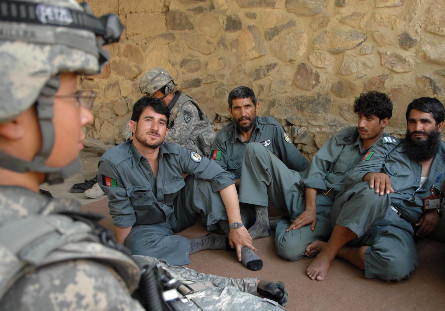NATO and the Afghan government must stop using local militias against the Taliban; the poorly trained forces are doing more harm than good, and risk causing a new civil war, say 29 local and international NGOs in a message to NATO leaders ahead of their Lisbon summit on 19-20 November.

The Afghan police - more training needed. (Photo: US ARMY)
In a bid to fill immediate security gaps, the government, backed by NATO, has been implementing a controversial community defence programme in which local men are hired to fight Taliban insurgents in areas where government forces have no, or only a weak, presence.
“Countless community defence initiatives have been attempted in Afghanistan, but they have all too often failed to improve security,” said the NGOs in a report entitled Nowhere to Turn: The Failure to Protect Civilians in Afghanistan.
“Terminate implementation of Afghan Local Police (ALP) and other community defence initiatives. Instead, devote greater resources to the development of a professional and accountable Afghan National Police,” it said, adding that NATO must also help curb rampant corruption and rights violations allegedly committed by Afghan security forces.
NATO aims to train over 300,000 Afghan army and police forces by October 2011 and give them a bigger role, as foreign countries prepare to draw down their forces.
Aid agencies warn that ALP and other semi-formal armed local groups could be exploited by insurgents, warlords and criminal gangs - something that could lead to increased violence and crime.
“In a country suffering from three decades of conflict, including a volatile civil war, such programmes risk fanning the flames of ethnic or factional violence and result in a proliferation of armed actors, making discussions on access even more difficult for humanitarian actors,” Farhana Faruqi Stocker, head of the NGO Afghanaid, told IRIN.
“A new civil war”
The Taliban control, or have significant influence in, over half of the country, said the report. Thousands of civilians have been killed and many others forced out of their homes in a steady upsurge of violence over the past couple of years.
“Some analysts even fear a new civil war,” said the NGOs, including Action Aid, Afghan Civil Society Forum and the Afghan Women’s Network.
“You don’t have a strong government throughout the country; you don’t have security forces at a level where they can control the entire country; and there are a lot of local power brokers who are incredibly strong, and you have the insurgency. So if the government is weak, international forces leave, and all these sub-national forces compete for control and authority, that’s definitely concerning.” Ashley Jackson, an author of the report and head of Oxfam International’s advocacy programme, told IRIN.
“Most ordinary Afghans we work with are very weary of growing ethnic rifts, the re-mobilization and empowering of former strongmen and armed groups associated with them, and of weak government writ,” said Afghanaid’s Stocker.
Afghan civilians are caught in an intensifying conflict in which pro-government forces ostensibly seek to “win hearts and minds”, while anti-government forces try to stop this violently, aid workers say.
“Experience in Afghanistan has shown that when one party to a conflict makes the population the prize, the opposition is likely to make them a target,” said Jackson.
“As world leaders meet at the NATO summit in Lisbon, we strongly urge them, along with all parties to the conflict, to minimize the harm to civilians and reduce threats and disruption to basic services, and development and humanitarian activities across Afghanistan,” said the report.
At the same time, the aid agencies also called on armed opposition groups to respect the lives and property of civilians and aid workers.



